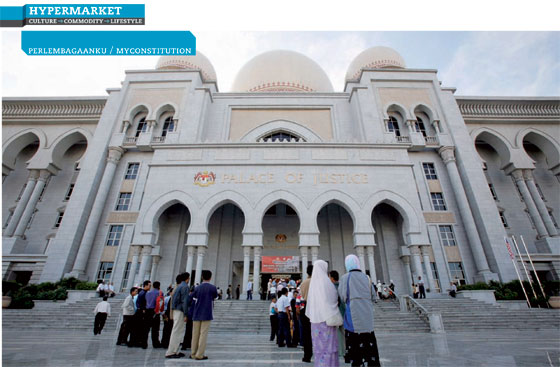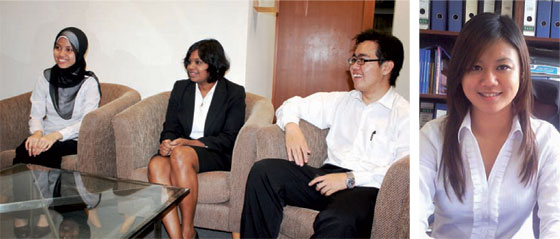
Surely a competent, unbiased and diligent thing to do is to assign this very important case to Judges who have not been involved in any of the ‘Perak Cases’ before -- so that the public would not view or perceive any bias on the part of the Judges, especially when the Judges who are now sitting have decided against Nizar (and in favour of Zambry) in one or two of the ‘Perak Cases’ before.
NO HOLDS BARRED
Raja Petra Kamarudin
When I was detained under Section 73(1) of the Internal Security Act in April 2001, my wife filed a Writ of Habeas Corpus. We lost the case so my wife then filed an appeal and eventually it went up to the Federal Court and was heard by a five-man bench as follows:
1) Mohamed Dzaiddin Abdullah, CJ
2) Wan Adnan Ismail, PCA
3) Steve Shim Lip Kiong, CJ (Sabah & Sarawak)
4) Abdul Malek Ahmad, FCJ
5) Siti Norma Yaakob, FCJ
Halfway through the hearing, Wan Adnan died and I was asked whether I would like to ask for him to be replaced or go with the remaining four-man bench. If I insist that the dead Judge be replaced then the case would have to start all over again.
The Chinese say ‘four’ means ‘die’ but so much time had already been wasted and I did not want to go through the whole thing from the beginning. I agreed to take my chances and go with the four-man bench, which was actually quite dangerous if the decision turns out to be two-two with no fifth vote.
On 6 September 2002, the four-man bench ruled my detention illegal. Nevertheless, I had already been released by then so it was merely a ‘technical win’. But it was important because this meant that the court agreed that my detention was illegal and this would help in the event I get detained a second time some time in the future.
And, as suspected, I was detained a second time in September 2008. And, yet again, my wife filed a Writ of Habeas Corpus. And, yet again, the court ruled my detention illegal and freed me on 7 November 2008.
But this time there was a slight twist to the whole issue. The government decided to appeal against my release at around the same time that the government announced it would not appeal the Razak Baginda acquittal on the murder charge.
My lawyers requested a nine-man bench. We thought at best we would get a five-man bench. Seven Judges would have been good but we could live with five, like the last time in 2001-2002.
But the court turned us down. They would only give us a three-man bench. And when we asked on whose decision this was made we were told it was ‘an administrative decision’, whatever that means.
We were also not told who the three judges were going to be even though we asked. It was not until the morning of the hearing that we knew who the Judges were and one of them was certainly not acceptable because over the last 11 years I had insulted him many times and called him a slime-ball and a scumbag.
And considering what I had written about him -- and am still writing about him until today -- how can I be expected to get a fair hearing? Even I would send myself to jail based on what I had written about the Judge. And we objected to this Judge being in the Coram and asked that he be replaced.
But the Federal Court turned us down and refused to listen to our objections. The court insisted that the hearing proceed with the three Judges and I told my lawyers to walk out of court and boycott the hearing if the court refuses our request to replace that Judge who was clearly my ‘enemy’.
And that was when the court backed down.
My lawyers then filed an appeal in another court and this second court agreed that we had grounds to object to one of the members of the three-man bench. Then they suddenly ‘froze’ my case. After telling us not to waste any time and that they are going to proceed with my hearing immediately without further delay, they suddenly just went to sleep and for the last nine months we have heard nothing from the court.
It is apparent they realise they are not able to proceed with the hearing unless they agree to our request to change one of the Judges. But they do not wish to change the Judge. So this means they can’t proceed with my hearing.
So what do they do? If they do not proceed with the hearing, because they refuse to change the Judge, then they can’t get me back into Kamunting. Ah, but they can. If they can’t get me back into Kamunting by reversing the court decision to free me, they can always get me back by issuing a new detention order.
Just ignore the earlier detention order -- which is being contested and which the court has already declared null and which is being argued in court as to whether the three-man bench should be changed. It is already getting too messy anyway. Issue a fresh detention order and bypass the entire court process. After all, there are hundreds of other articles published in Malaysia Today that they can use as the justification for a fresh detention order.
And that was when I decided I have had enough of the Malaysian judicial system. I am prepared to fight them in court if they play fair. But to fuck around with the selection of Judges and then bury the hearing when they realise they are losing and then pursue me with a fresh detention order is pushing it a bit.
And that was when I decided to tell the court to go fuck itself. I am no longer going to entertain this charade and sham trial in a kangaroo court. They can’t keep moving the goalposts halfway through the game when they find they can’t win. And even after moving the goalposts and they find they still can’t win they declare game over and start a new game.
I am not as stupid as I look. And if the government thinks I am going to sit there while they play around with the judicial system and snigger behind my back then they got another think coming. Now it is I who am having the last laugh on them.
And now we see the same thing happening in the Perak Constitutional Crisis fiasco.
In the recent appeal in the Federal Court, a five-man bench sat to hear the case. The Coram was:
1) YAA Tan Sri Dato' Seri Alauddin bin Dato' Mohd. Sheriff (President of the Court of Appeal)
2) YAA Dato’ Arifin bin Zakaria (Chief Judge of the High Court of Malaya)
3) YA Dato' Zulkefli bin Ahmad Makinudin (Federal Court Judge) (appointed 5th September 2007)
4) YA Datuk Wira Haji Mohd Ghazali bin Mohd Yusoff (Federal Court Judge) (appointed April 2009)
5) YA Dato' Abdull Hamid bin Embong (Federal Court Judge) (appointed October 2009)
The Federal Court has nine Judges. In addition to this, the Chief Justice; President of the Court of Appeal; Chief Judge of Malaya and the Chief Judge of Sabah and Sarawak also sit in the Federal Court. So, in total, there are 13 Judges who sit in the Federal Court. They are, in order of seniority:
1) YAA Tun Dato’ Sri Zaki bin Tun Azmi (Chief Justice) - A
2) YAA Tan Sri Dato' Seri Alauddin bin Dato' Mohd. Sheriff (President of the Court of Appeal) - B
3) YAA Dato’ Arifin bin Zakaria (Chief Judge of the High Court of Malaya) - B
4) YAA Tan Sri Datuk Seri Panglima Richard Malanjum (Chief Judge of Sabah and Sarawak) - A
5) YA Dato' Zulkefli bin Ahmad Makinudin (Federal Court Judge) (appointed 5th September 2007) - B
6) YA Dato’ Sri Augustine Paul - C
7) YA Dato’ Hashim bin Dato’ Haji Yusoff - A
8) YA Datuk Gopal Sri Ram - A
9) YA Datuk Wira Haji Mohd Ghazali bin Mohd Yusoff - B
10) YA Dato’ James Foong Cheng Yuen - C
11) YA Dato’ Mohd Raus bin Sharif - C
12) YA Dato' Abdull Hamid bin Embong - B
13) YA Datuk Heliliah binti Mohd Yusof - A
The ones marked ‘B’ in green are the Judges in the recent Federal Court ‘Perak Case’. These are Judges who had always been involved in the other ‘Perak Cases’. The chart below provides all the Judges who have been involved, one way or another, in the other ‘Perak Cases’ in either the Court of Appeal or the Federal Court.
The ones marked ‘A’ in red have never been involved with any of the ‘Perak Cases’.
The ones marked ‘C’ have been involved in one or two of the ‘Perak Cases’.





It is not suggested that the Judges who have been involved in any of the ‘Perak Cases’ before ought not to hear the Federal Court appeal. They involve different issues. But the bigger issue here is the perception of the public. Surely a competent, unbiased and diligent thing to do is to assign this very important case to Judges who have not been involved in any of the ‘Perak Cases’ before -- so that the public would not view or perceive any bias on the part of the Judges, especially when the Judges who are now sitting have decided against Nizar (and in favour of Zambry) in one or two of the ‘Perak Cases’ before.
The questions, which the public now asks, are:
i) Why is the appeal not fixed to be heard before Judges who have not heard any of the ‘Perak Cases’ before (the ones marked ‘A’ in red)? Of course, Tun Zaki cannot hear this case because he has said he will not be involved in any cases involving UMNO. So the other four Judges could still hear this latest case together with another Court of Appeal Judge who similarly has not been involved at all. (Under the law, Judges of the Court of Appeal may sit in the Federal Court).
ii) When Tun Zaki said he will not get involved in any ‘UMNO cases’, does that mean he can still exercise his administrative power, i.e., the power of choosing the Judges to hear a case involving UMNO? Was he not the one who selected the Judges in this latest appeal?
iii) Why, in an important case involving Constitutional issues such as this, junior Judges are selected instead of more senior Judges?
iv) Would it not be more prudent, diligent, as well as competent, had the Court been convened with a seven-, nine- or even 11-man bench (or even 13) considering the constitutional ramifications of the latest appeal? This case has to review the Ningkan; Amir Kahar and Adegbenro v Akintola case. It brings long-lasting consequences to Malaysian politics and administration. It will define the function, power and discretion of the Sultan (as well as the Agong -- because the Federal Constitution has similar provisions as the Perak Constitution) in relation to a very important matter, i.e., the dissolution of the Assembly/Parliament. This case will be the causa celebrae for the future. It will set precedents. Even in two drug cases, a seven-man bench was convened.
a) ARULPRAGASAN SANDARAJU V. PUBLIC PROSECUTOR
FEDERAL COURT, KUALA LUMPUR
TAN SRI DATO' SERI EUSOFF CHIN CJ TAN SRI DATO' LAMIN MOHD YUNUS PCA TAN SRI DATO' ANUAR ZAINAL ABIDIN CJ (MALAYA) TAN SRI DATO' MOHD AZMI KAMARUDDIN FCJ TAN SRI DATO' EDGAR JOSEPH JR FCJ DATO' PADUKA MOHAMED DZAIDDIN FCJ DATO' WAN ADNAN FCJ
[CRIMINAL APPEAL NO: 05-237-92] – 27.7.1996
b) PP V. TAN TATT EEK & OTHER APPEALS FEDERAL COURT, PUTRAJAYA AHMAD FAIRUZ CJ ; ABDUL MALEK AHMAD PCA ; HAIDAR MOHD NOOR CJ (MALAYA) ; STEVE SHIM CJ (SABAH & SARAWAK) ; SITI NORMA YAAKOB FCJ ; PAJAN SINGH GILL FCJ ; AUGUSTINE PAUL JCA [CRIMINAL APPEAL NOS: 05-40-2002 (W), 05-41-2002 (W), 05-68-2002 (P) & 05-70-2002 (P)] - 3 FEBRUARY 2005
The above cases are drug related cases, which concerns the interpretation of the Criminal Procedure Code as well as the Dangerous Drugs Act. But it was deemed fit to convene a seven-man bench because of the ramifications of the case. Surely matters involving Constitutional issues should attract the same, if not more, amount of attention and concern so as to justify a full bench.

 KUALA LUMPUR, Nov 10 — Former chairman of MCA’s legal bureau Datuk Leong Tang Chong today claimed that Datuk Seri Liow Tiong Lai (picture) is still the party deputy president as the Registrar of Societies (RoS) never reinstated Datuk Seri Dr Chua Soi Lek to the post.
KUALA LUMPUR, Nov 10 — Former chairman of MCA’s legal bureau Datuk Leong Tang Chong today claimed that Datuk Seri Liow Tiong Lai (picture) is still the party deputy president as the Registrar of Societies (RoS) never reinstated Datuk Seri Dr Chua Soi Lek to the post. By Syed Jaymal Zahiid - The Malaysian Insider
By Syed Jaymal Zahiid - The Malaysian Insider PUTRAJAYA, Nov 10 — Prime Minister Datuk Seri Najib Razak said today that Malaysia needs a new paradigm if it wants to catch up with developed nations in terms of industrial advancement.
PUTRAJAYA, Nov 10 — Prime Minister Datuk Seri Najib Razak said today that Malaysia needs a new paradigm if it wants to catch up with developed nations in terms of industrial advancement.






 Off the Edge
Off the Edge 











 Her testimony, based on government forensic reports, sparked the argument for a second autopsy, which Azmil agreed to last week.
Her testimony, based on government forensic reports, sparked the argument for a second autopsy, which Azmil agreed to last week.

 According to the affected cowherd KT Sivananthan, 39, the demolition started at 12.15 pm and his cowshed was completely flattened by 4pm. Around 10 members of the police force were present during the demolition.
According to the affected cowherd KT Sivananthan, 39, the demolition started at 12.15 pm and his cowshed was completely flattened by 4pm. Around 10 members of the police force were present during the demolition. Chief Minister Lim Guan Eng (right) and Ramasamy were both unavailable for comment as they are on an official trip to the Middle East.
Chief Minister Lim Guan Eng (right) and Ramasamy were both unavailable for comment as they are on an official trip to the Middle East. Sivananthan (left) has lodged a police report at 2.40 pm in Jelutong police station over the demolition.
Sivananthan (left) has lodged a police report at 2.40 pm in Jelutong police station over the demolition. Kampung Buah Pala was once the major supplier of fresh cow's milk on the island, including the Penang Hospital.
Kampung Buah Pala was once the major supplier of fresh cow's milk on the island, including the Penang Hospital.